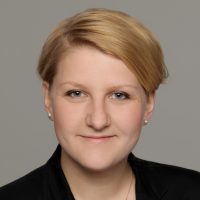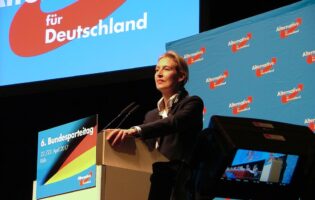Eine deutsche Metamorphose: Vom unsicheren Kantonisten zur europäischen Führungsmacht

Liana Fix
Council on Foreign Relations
Liana Fix is a fellow for Europe at the Council on Foreign Relations (CFR). She is a historian and political scientist, with expertise in German and European foreign and security policy, European security, transatlantic relations, Russia, and Eastern Europe. She is also the author of A New German Power? Germany’s Role in European Russia Policy (Palgrave Macmillan, 2021). Dr. Fix’s work focuses on German domestic and foreign policy, the European Union, transatlantic relations, and Europe’s relations with Russia and China.
Prior to joining CFR, Dr. Fix was program director for international affairs at Körber-Stiftung in Berlin. She was also a resident fellow at the German Marshall Fund in Washington, DC, and a DAAD/AICGS fellow at the American Institute for Contemporary German Studies. From 2018 to 2019, she was a fellow for global governance futures at the Robert Bosch Foundation Multilateral Dialogues. From 2014 to 2016, Dr. Fix was a doctoral fellow at the German Institute for International and Security Affairs and associate fellow at the German Council on Foreign Relations. From 2012 to 2013, Dr. Fix worked as a Mercator fellow for international affairs at the German Federal Foreign Office, the EU Delegation in Tbilisi, and the Carnegie Moscow Center.
Dr. Fix has contributed essays, policy papers, and articles to peer-reviewed journals including Foreign Affairs, Foreign Policy, and the Washington Quarterly, among others. She is also a frequent contributor to international and German-language media.
Dr. Fix received her MSc in theory and history of international relations from the London School of Economics and Political Science and her PhD in political science from the Justus Liebig University Giessen. She is a member of the European Leadership Network Younger Generation Leaders Network on Euro-Atlantic Security and of Women in International Security.
Deutschland ist zum Vorreiter in Europa geworden: zu einer Führungsmacht, die ihre Legitimität aus dem Engagement für ein zivilisiertes Miteinander zieht. Daraus erklärt sich auch die bisherige Gefolgschaft anderer europäischer Länder: aus dem Vertrauen heraus, dass Deutschland verantwortungsvoll Prinzipien verteidigt, und nicht nur Eigeninteressen.
The article originally appeared in the November/December issue of Internationale Politik. Continue reading here.







